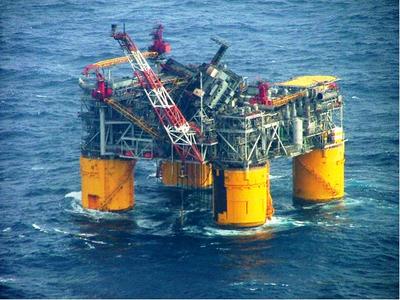Wind, Water and Oil
Posted by Big Gav
The Baltimore Sun has a good op-ed piece on the effects of Hurricane Katrina, an oil supply chain that is "stretched to capacity" and the link between global warming and increased hurricane strength.
AS LOUISIANA, Mississippi and Alabama today cope with the terrible material and human devastation left in the wake of Hurricane Katrina, the entire nation -- while thankful that the hurricane was not as lethal as feared -- braces for a fierce oil-price storm in its aftermath. As Katrina blew in, the prices of crude oil, gasoline, natural gas and heating oil hit all-time highs. The Category 5 storm forced the evacuation of oil and natural gas rigs in the Gulf of Mexico that account for as much as 30 percent of U.S. production, the closing of the Louisiana port that handles 11 percent of U.S. crude imports, and the shuttering of gulf coast oil refineries that are the major source for East Coast markets.
The worldwide supply chains for oil and natural gas -- already stretched to capacity and vulnerable to the slightest political tremors -- are no less fragile in the face of savage formations of wind and water. It turns out that if below-sea-level New Orleans has been a national disaster just waiting to happen, so also is the dense concentration of energy production, importing and refining along the gulf coast -- one with concrete national security implications.
For the last week, water temperatures in much of the gulf have been higher than average, as warm as 90 degrees. Such warmer waters fuel the formation and ferocity of hurricanes. Warmer oceans are an inseparable by-product of global warming, and it's foolish to ignore the link to the burning of fossil fuels.
In coming days and weeks, if Hurricane Katrina drives further home this nation's Faustian overdependence on oil, it also should highlight the environmental damage that results from that dependence. From oil to oil, this storm -- the fiercest to strike the gulf coast in decades - should put the spotlight on a vicious cycle in which America has rapped itself.
Sometimes a picture says a thousand words - some before and after shots of the Mars platform.
Royal Dutch Shell said an aerial inspection of its Mars platform, which produces 147,000 barrels of oil and 157 million cubic feet of gas per day, showed some damage to its upper deck.
 |  |

New Orleans seems to be a complete mess now, with the death toll and damage assessment still uncertain, and martial law has now been declared.
Moving on to a more general news roundup, BHP CEO Chip Goodyear has predicted the oil price will fall over $20 per barrel next year. While I imagine Chip has access to better data than Steve Forbes, I still don't see how anyone could predict this unless there is a large amount of demand destruction somewhere. There are no reports about damage to the company's Mad Dog or Atlantis fields as yet.
BHP Billiton Ltd chief executive Chip Goodyear has said the price of crude oil could fall up to $US20 per barrel in the next 12 months. When asked to estimate the price of oil per barrel in 12 months time, Mr Goodyear said: "I think you are looking at a range of probably $US40-$US50 (per barrel)". Mr Goodyear was speaking at the Forbes Global CEO Conference in Sydney.
There seems to be a few demonstrations going on around the city today against the conference, though I haven't seen anything around my neck of the woods other than a few helicopters circling and the occasional police car heading north.
Treasurer Peter Costello was on TV tonight showing that he is just as out of touch with the global oil market is he is with a lot of issues within the country, saying that the solution to high oil prices was international pressure on OPEC to pump more oil. Perhaps they should have asked Malcolm Turnbull for a more informed view.
Mr Costello told Southern Cross Radio that higher output from oil producers is the best way to bring petrol prices down. "I think we've got to raise our voice about OPEC and the production of oil," he said.
"If the world could get the production of oil increased, that would be the most concrete thing that could lead to a lowering of the petrol price," he said.
The Christian Science Monitor has an interesting article on the proposed Iranian oil bourse - "Iran's oil gambit - and potential affront to the US", the creation of which is probably the worst sin the mullahs could commit in the eyes of the US government. As Malcolm Fraser would say - achieving global hegemony wasn't meant to be easy.
The Iranian government's plans to create an oil exchange fit into a strategy of weakening US economic hegemony.
Is the biggest threat Iran poses to the United States really its nuclear ambitions - or is it petropolitics?
James Howard Kunstler has a guest column today from Dmitry Podborits who takes a dim view of the Freakonomics take on peak oil.
The scariest thing for me here is not the flimsiness and the stupidity of the rebuttal, but the CONFIDENCE and the LACK OF INTEREST IN THE REALITIES OF THE WORLD that they are pronounced with. Even scarier, however, is that these commentators are smart people with high IQ, regarded throughout the world as authorities in economics. When these two talk, many listen.
Of course people respond to incentives! Of course markets will attempt (as they have been attempting for a long time, without success) to find substitutes within the same basic economic structure.
However, is there a physical law stating that an adequate substitute, fitting into any existing infrastructure and cost structure, and satisfying the needs of any living arrangement, has to exist? I wish the freakonomists were there with me during my various travels -- from Mexico to Greece to Alaska -- where I saw communities of various scales abandoned and in ruins because the populace couldn't find at sufficient cost and quantities the resources they have come to depend upon, from water to arable soil to fish in the sea to mineable minerals. What if the vast literature dedicated to discussing the inadequacy of all currently known putative replacements for cheap oil has a point?
One of my pet gripes with the seemingly commonly held view amongst Libertarians and economists that peak oil isn't a problem as "the market will take care of it" is my belief that the market doesn't guarantee anything other than "efficent" allocation of resources and balancing supply and demand via prices - nothing more. If you can't find a better replacement for a particular good or service you have to make do with an inferior one - the market won't conjure a better, cheaper and less environmentally harmful one out of thin air, no matter how hard you believe it will happen.
Andrew McNamara said much the same thing in his recent interview:
I guess there is a broad issue here that, in terms of advice governments get, we rely on economists, and I don't want to nag economists as a class, there nice people, some of my best friends are economists, but there's this belief that the price mechanism will sort out all problems, that supply and demand will come into equilibrium eventually and that the rising price of any good will make alternatives more attractive and make exploration and development of that particular product more attractive and therefore more will be found. The underpinnings of that analysis are that there is always more to be found, that there is no natural limit, and I guess there's a clash between the man-made laws of economics and the universal fundamentals of the laws of physics, and I think the laws of physics are always going to win. So, as we find oil, for example, becoming more and more expensive to find, it doesn't mean that, with the price of oil going up it'll always be worthwhile doing it. If it costs you more than a barrel of oil to get a barrel of oil out of the ground, then it doesn't matter whether the barrel of oil's worth a hundred dollars or a million dollars, it's not worth doing.
Rigzone reports that "Resources Under Somalia May Once Again Become Accessible", with "Chevron and ConocoPhillips crossing their fingers that their former concessions in northern Somalia will be honored now that the country is coming out of nearly a decade and a half of chaos." Given that the transitional government hasn't dared base itself inside the country yet I'd say this could be a slow process.
While many Western countries were looking at Somalia's resources before the country's descent into civil war, those countries may find getting their concessions back not as easy as getting them in the old days. Some concessions formerly held are now hard to trace because they existed in parts of the country that are no longer parts of the current country. New concessions may be hard to get as the government attempts to legislate the management of its natural resources before it gives its okay to explore and pull any of those resources out of the ground.
Treehugger has a number of interesting posts today, inlcuding one on rising oil prices boosting the value of recycled plastic, one on US tax credits for installing solar energy systems and finally an example of energy waste par excellence - skiing in Dubai.
 Finally, in an example of how long it takes to arrest environmental changes, the BBC reports on major ozone loss over Antarctic.
Finally, in an example of how long it takes to arrest environmental changes, the BBC reports on major ozone loss over Antarctic.New readings from the European satellite Envisat suggest that this year's southern hemisphere ozone hole may be one of the largest on record. The hole covers an area of 10 million sq km (four million sq miles) - approximately the same size as Europe. It is expected to continue expanding for two to three weeks.
There have been signs over the last two years that damage to the ozone layer has reduced, but a full recovery is not expected until around 2050.


 Two rigs appear to be drifting and another rig that was in a dock in Alabama broke free of its restraints and collided with a
Two rigs appear to be drifting and another rig that was in a dock in Alabama broke free of its restraints and collided with a  Local parahistory buffs will be alarmed to learn that
Local parahistory buffs will be alarmed to learn that 

 It seems everyone else has commented on this already -
It seems everyone else has commented on this already - 
 Bush and Cheney's obsession with the War on Terror / War for Oil (and its resulting funnelling of vast streams of cash into the coffers of their associated companies like Halliburton and the Carlyle Group) may come back to bite them if the disaster relief effort runs into problems and US taxpayers start to wonder why disaster relief programs have been gutted, as this New Orleans area article
Bush and Cheney's obsession with the War on Terror / War for Oil (and its resulting funnelling of vast streams of cash into the coffers of their associated companies like Halliburton and the Carlyle Group) may come back to bite them if the disaster relief effort runs into problems and US taxpayers start to wonder why disaster relief programs have been gutted, as this New Orleans area article 









